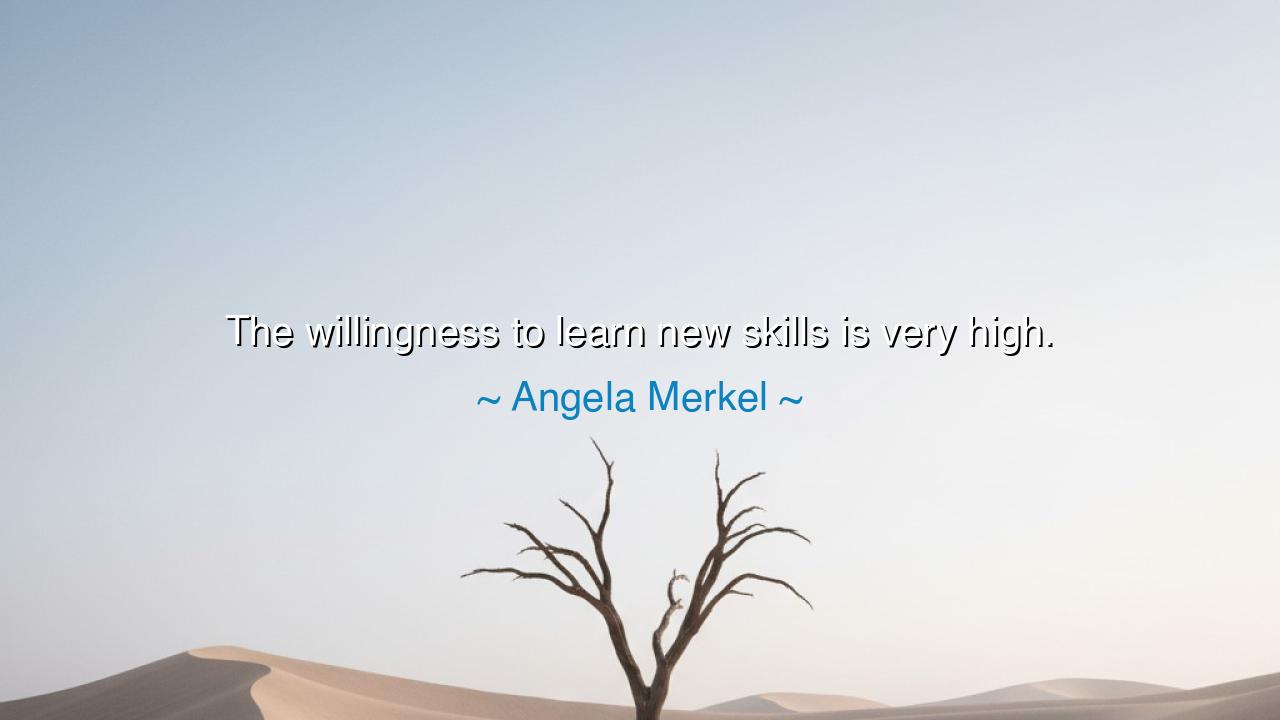
The willingness to learn new skills is very high.






In the calm yet resolute words of Angela Merkel, the great chancellor and daughter of both science and history, there lies a truth that speaks not only to her people but to all humankind: “The willingness to learn new skills is very high.” These words, though simple in form, carry the weight of civilizations — for they are not merely an observation of a workforce, but a declaration of the human spirit’s capacity for renewal. Merkel, trained as a physicist and tested as a leader, understood that the true power of a nation does not lie in its wealth or armies, but in the minds and hearts of its people — in their ability to adapt, to learn, to rise again when the world changes beneath their feet.
In ancient times, the philosophers would have called such a virtue metanoia, the turning of the mind toward transformation. For every age demands its own wisdom, and every generation must learn anew the arts of survival and creation. To be willing to learn is to remain alive — for stagnation is death to both individuals and nations. Merkel spoke from a Germany that had rebuilt itself from ruin, reimagined itself through industry and intellect, and faced yet again the storms of globalization and technology. Her words reflect not pride, but faith — faith in the resilience of humanity, in the idea that no challenge is greater than the mind that seeks to overcome it.
Consider the lessons of history, which echo this truth across the ages. When the great city of Athens was struck by plague and war, it did not perish through despair; it rose again through philosophy, through inquiry, through the education of the young. Socrates and Plato taught their people that the unexamined life is unworthy of the human soul — and so Athens became not merely a city of walls, but a school of wisdom for the world. In the same way, Merkel’s Germany, forged from hardship, placed its faith not in conquest but in knowledge. Her statement honors that lineage of thought — that civilization thrives not through the stubborn defense of the old, but through the courage to learn the new.
And yet, learning new skills is not only the work of nations — it is the journey of every soul. Each person, from youth to old age, faces the test of renewal. There are seasons when the tools we once mastered no longer serve us; when the world, like a river, shifts its course. In those moments, we must choose: to cling to the stones of the past, or to wade bravely into the current of change. The one who chooses learning is never defeated. The one who resists it is conquered by his own fear. Thus, Merkel’s words are not merely economic; they are spiritual. They speak to the eternal discipline of growth, to the humility of saying, “I do not yet know — but I can learn.”
Let us recall, too, the tale of Leonardo da Vinci, the eternal student of the world. Painter, engineer, anatomist, dreamer — he lived as one who never ceased to learn. His notebooks teem with questions rather than answers, with sketches of wings, canals, and stars. He was not content to perfect one art; he sought to understand all of creation. Leonardo’s greatness did not lie in genius alone, but in his willingness to learn new skills, to approach every mystery with wonder. So too must we — for in a world that changes faster than ever before, curiosity has become the highest form of strength.
In this, Angela Merkel’s wisdom is profoundly modern yet deeply ancient. Her words remind us that human dignity is found in adaptability — in the power to evolve without losing the essence of who we are. To learn is to resist despair; to grow is to defy decay. The one who is always learning cannot be conquered, for knowledge renews him like the sun renews the earth each dawn. Nations that cultivate this spirit will never wither, for their people will always find a way forward — through science, through craftsmanship, through the quiet heroism of study and skill.
The lesson, then, is both simple and sacred: never cease to learn. When the world changes, change with it — not in fear, but in purpose. Seek out new knowledge as a farmer seeks new soil, knowing that every skill you gain is a seed for the future. Teach others what you have learned, for learning unshared is wisdom wasted. And when you feel old, tired, or uncertain, remember Merkel’s faith in the human will — that the fire of curiosity burns in all who dare to feed it.
So, my listener, let these words echo within you: “The willingness to learn new skills is very high.” For they are not merely the observation of a stateswoman, but the song of human destiny itself. To learn is to live. To adapt is to rise. And to keep learning, even in the face of uncertainty, is to walk the eternal path of renewal — the path by which every generation, and every soul, reaches its highest and truest height.






AAdministratorAdministrator
Welcome, honored guests. Please leave a comment, we will respond soon